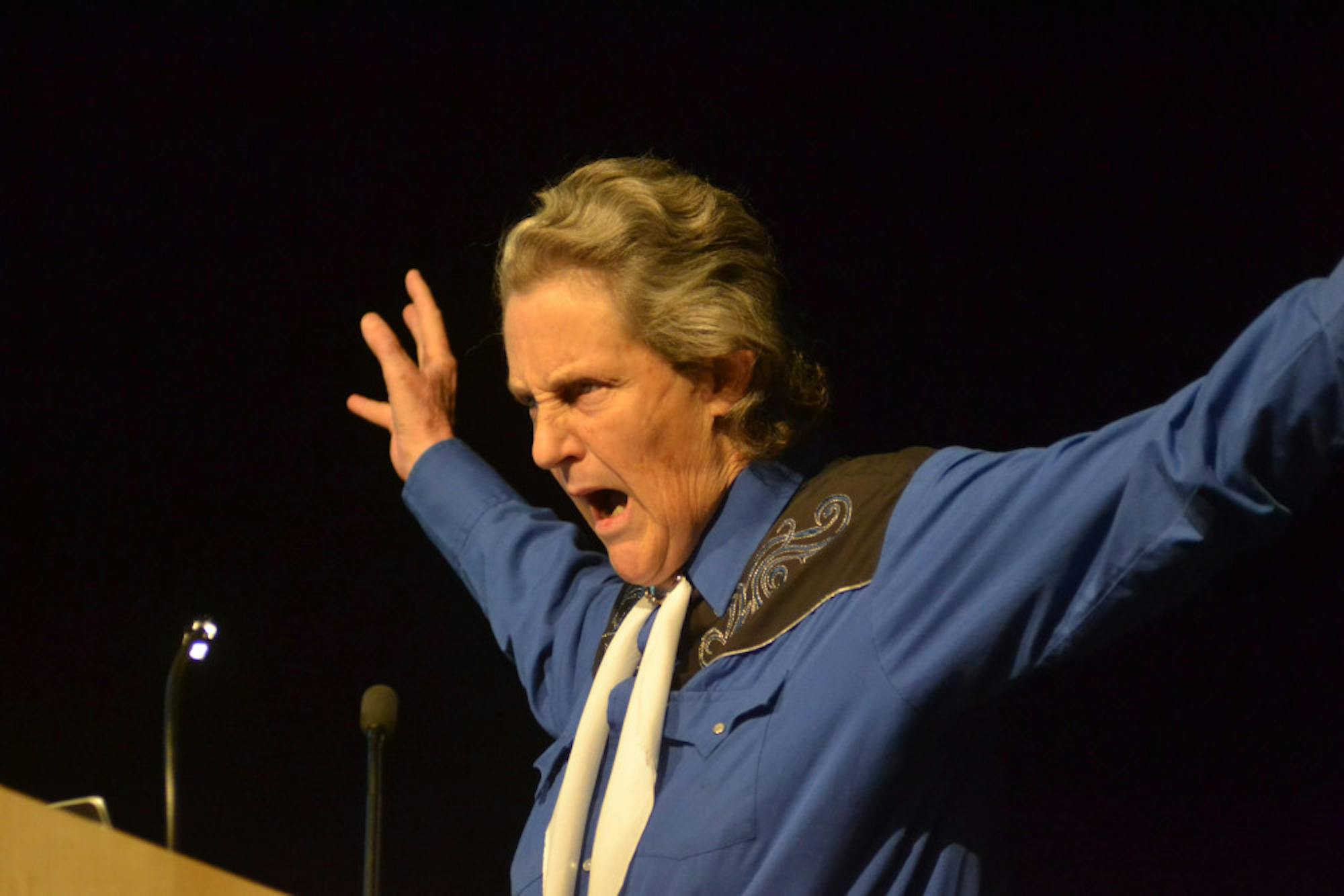Tufts students and community members gathered to hear Dr. Temple Grandin, a lecturer on autism and animal handling, give a talk titled "My Life with Animals" in Cohen Auditorium Monday evening. Grandin is a professor of animal science at Colorado State University and a consultant for livestock handling facilities, as well as the subject of a 2010 HBO biopic, according to the Grandin Livestock Handling Systems website. Through her work, Grandin has transformed the functioning of slaughterhouses in the United States, with half of the cattle in the country now handled through a system she designed that minimizes fear stress for animals.
The event was sponsored by the Cummings School of Veterinary Medicine, the Cummings School's Office of Continuing Education, Tufts Institute for Human-Animal Interaction (TIHAI) and the Center for Animals and Public Policy.
Dr. Lisa Freeman, director of TIHAI, introduced Grandin and the TIHAI department at the podium before the talk.
“While Dr. Grandin has visited Tufts before (on the Cummings School of Veterinary Medicine campus), this is the first time that TIHAI has hosted her (with support from the Lawrence Fund),” Freeman wrote in an email to the Daily.
Freeman said that TIHAI was launched in March of this year to promote the health, strength and well-being of humans and animals through trans-disciplinary partnerships that foster innovative research, education and service programs in human-animal interaction. She explained how the healing power of animals enriches people's lives in many ways, such as with seeing-eye dogs, therapy dogs and therapeutic horseback riding.
During the lecture, Grandin spoke about her work with livestock and the discussion of the feeling of “fear” in animals.
“Fear is a proper scientific word as used in veterinary science literature; it is this fear that we wrongly perceive as agitation in animals,” she said. “Always remember: a calm animal is easier to handle.”
Grandin discussed at length the symptoms of fright in animals and addressed the importance of acclimating animals to handling. She also said that over-selecting for a single trait may cause defects in animals.
According to Grandin, separation distress varies in different animals.
“Sheep may not be sad being separated from owner as opposed to dog,” she said.
Grandin also spoke about various animal procedures in which voluntary cooperation from the animal is important.
“When an animal is forced into procedure, you see fear stress,” she said.
She added that there is a need for animals to be acclimated to their environment, whether it is in a transport truck or at an animal show with flags and colorful decor.
“An animal’s first experience with a person, place [or] vehicle should be good to prevent the formation of fear memories,” Grandin said. “Animals have specific fears, and these include men with beards and women with long hair.”
She explained that animal thinking is sensory-based.
“Animals tend to pick up sensory detail we tend not to notice,” she said.
Grandin said that as an autistic person, she personally thinks in pictures and not in words. She added that she is also prone to being fearful.
“My amygdala, or fear center, is three times larger than that of a typical brain, and I’ve explained more about it in my book, ‘The Autistic Brain' [2013],” Grandin said.
More than half the audience gave Grandin a standing ovation after she finished her talk. The event culminated at the Tufts Bookstore opposite the auditorium, where Grandin sold signed copies of her books.
Event attendee Erin Dolan, a developmental specialist who works in early intervention, said was very excited to have listened to Grandin's lecture.
“She could spend the two hours talking about the history of chalkboards, and I would still be over the moon," Dolan said. "I think I'm starstruck!”
Dolan added that she has been following Grandin's work for many years.
“While I was in school, I read 'Emergence: Labeled Autistic' [1986] by Temple Grandin for a class, and my fascination with her started then,” she said. “Since college, I have read a bunch of her books and watched the HBO movie based on her life. Her books are well written and easy to read and provide an interesting perspective into the mind of a person with autism.”
Dolan said that Grandin's insight on humane animal handling will help her interact with her dog, who is afraid of things like thunder storms and the iron being turned on, as well as the kids that Dolan works with.
“Dr. Grandin’s insight on how to help animals be less afraid and different types of fear responses was very interesting and thought provoking,” Dolan said.
Dolan said she greatly admires Grandin for the work that she has done in her field of work as a woman.
“In a time where ranch hands were almost 100 percent male, she did some trailblazing work,” Dolan said. “She was able to change how people handled cattle at slaughterhouses, and a lot of her gift in her area of work can be attributed to how her brain works because of her autism.”
Dan Houlihan, a post-doctoral occupational therapy student at Tufts, said he was at the talk because of his interest in Grandin's work on autism and animal treatment.
“Looking around, I can tell you that the Tufts Occupational Therapy Department is heavily represented here this evening,” Houlihan said. “Temple Grandin has brought a lot of focus on autism [and on how we treat animals] that I’m really fascinated by."
Students, community members attend Temple Grandin lecture

Professor of animal science at Colorado State University Temple Grandin spoke to students and community members in Cohen Auditorium on Nov. 30. Grandin is an autism activist as well as an expert in the field of animal research.





